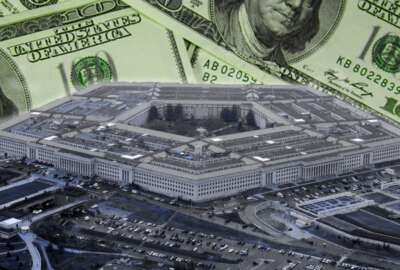Top lawmakers say they are optimistic that they can pass the 2021 defense authorization bill even if the president vetoes the legislation late in the year.
House Armed Services Committee Chairman Adam Smith (D-Wash.) and Ranking Member Mac Thornberry (R-Texas) said they favor keeping lawmakers in Washington for a late session to overrule President Donald Trump’s likely veto of the bill.
If Trump vetoes the bill on Christmas Eve, then Congress would be forced to come back from break for a special session between Christmas and New Year to pass the bill. The bill must be passed by Jan. 3, 2021, when the new legislative cycle starts. Otherwise, Congress will have to start the bill all over again, which would leave it open to new provisions and negotiations.
The House and Senate most likely have the votes to override a presidential veto.
“If the president vetoes it then we will come back and vote to override,” Smith said in a call with reporters Monday. “There’s no way, given the importance of the bill, that we can’t. We’ve got troop bonuses that will terminate, we’ve got military construction projects that will terminate, we’ve got land that the military will no longer be able to use for training. We have numerous other provisions in this bill that are crucial. We can’t not come back and override.”
The president has threatened to veto the bill over two issues. One is the renaming of military bases that are named after Confederate officials. That provision has bipartisan support and the bill requires renaming the bases over a three-year period.
The second reason is for something that is not in the bill: Trump wants Congress to repeal section 230 of the 1996 Telecommunications Act. That provision protects tech companies from legal action if a third party posts lewd or hateful content on their sites.
Even the president’s most staunch supporters like Senate Armed Services Chairman Jim Inhofe (R-Okla.) say adding a provisions about section 230 into the NDAA is a no-go.
“It is impossible to add a repeal of Section 230 to the defense authorization bill,” Inhofe said in a statement last week. “The only other option would mean that for the first time in 60 years, we would not have an NDAA. Without an NDAA, our troops would not get flight pay. They wouldn’t get hazard pay or any other specialty pay that requires annual authorization for our service members overseas to get what they need.”
The bill also holds a 3% raise for active duty military.
“My goodness, when Jim Inhofe says that, it makes it look like the president is being unreasonable,” Smith said. “Jim is a pretty solid supporter of the president; it’s obvious that this is not about embarrassing the president. This is not about disagreeing with him. Sens. Inhofe and [Majority Leader] Mitch McConnell (R-Ky.) and many others have made it clear that this is not the right reason for a veto of a defense bill. And I’m still hopeful that that logic can carry the day and we won’t have to go through the override.”
Smith completely ruled out the option for a “skinny” defense authorization bill being passed in order to get some of the most critical provisions into law.
Part of that is because renaming the bases and facilitating more inclusion and diversity into the military are some of the most crucial provisions to some lawmakers.
“Here’s the other thing,” Smith said. “The president isn’t only planning a veto of the bill because of anything that’s in it. He’s also vetoing the bill because of what’s not in it. What’s not in it is also going to not be in the skinny bill. That’s what people keep forgetting about the skinny bill thing and sorry, but it just drives me crazy. It doesn’t solve the problem. He will veto the skinny bill as well, because what he wants is not in it.”
Copyright
© 2024 Federal News Network. All rights reserved. This website is not intended for users located within the European Economic Area.
